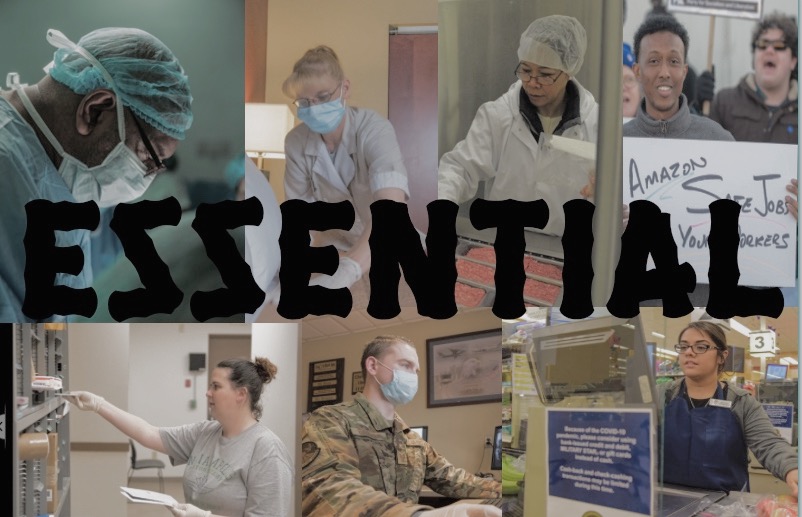Essential Workers Deserve More (OPINION)
May 8, 2020
Essential workers, also known as critical infrastructure workers, are employees involved in public safety and community wellbeing; during the coronavirus pandemic, they have been the backbone of the country by keeping essential businesses such as grocery stores and hospitals open. These workers have a responsibility to continue operations, and as a result, have been risking their lives daily to fulfill their duties.
“Essential workers are risking their lives and have not been receiving the proper compensation. In fact, not only are they risking their own lives, but they are sacrificing time they could be spending with their own family so that they can help society,” said Isabella Ruano (‘21).
Healthcare providers, law enforcement officers, farmers, and other employees are among a long list of essential workers that have kept the country functioning. Yet, they have gone practically unrecognized by the media and the Trump administration for their efforts. These individuals have willingly exposed themselves to coronavirus as part of their jobs, yet have been offered very little compensation or recognition for their bravery.
Although hourly wages for some essential businesses have been raised, the majority of essential businesses have not offered their employees any bonus money. Only 25% of companies that need employees to continue business have offered them bonuses, also known as hazard pay. Hazard pay is defined by the U.S. Department of Labor as “additional pay for performing hazardous duty or work involving physical hardship.” Additional pay for essential workers clearly falls under this definition, as essential employees often work countless hours, with little to no personal protective equipment, and are at higher risk for contamination.
“I think that essential workers should be provided with additional benefits. For many of them, it’s not an option to work remotely. Also, members of marginalized groups – who do not have the benefits that [other] people do in American society – are putting themselves at risk, and we need to be aware from a social justice perspective on how we care for people in this country, particularly those making lower wages with higher risk,” said English teacher Alison Jussaume.
Some policymakers, such as Republican Senator Mitt Romeny and several other House of Representative Democrats, have proposed various bills regarding hazard pay, which would be included in the government’s next stimulus package. Under Mitt Romney’s “Patriot Pay” proposition, essential workers making less than $50,000 a year would receive a bonus of up to $12 an hour in May, June, and July. Essential workers making between $50,000 and $90,000 would receive smaller tax credits.
Senate Minority Leader Charles Schumer and other Democrats have proposed a bonus of up to $13 an hour that would last until the end of 2020. The benefit would be capped at $25,000 for workers earning a yearly salary less than $200,000 and at $5,000 for workers earning a yearly salary greater than $200,000. Propositions by Democrats would include a greater variety of essential workers than Mitt Romney’s “Patriot Plan,” such as truck drivers and janitors.
Of course, hazard pay is only one part of the compensation that essential workers deserve. Money serves as as a form of recognition, but it is not enough to simply pay them higher wages without acknowledging the other hardships involved with being an essential worker. They deserve to have other rights and protections during these dangerous times. As outlined in Elizabeth Warren’s “Essential Workers Bill of Rights,” employees deserve to be protected at work, earn a livable wage, have collective bargaining, access universal sick paid leave, healthcare security, and child care support.
Frontline workers – health care, transit, farm, grocery, domestic & delivery workers – are risking their lives to keep America running. We can’t rely on big business to protect them. So @RepRoKhanna & I are proposing an Essential Workers Bill of Rights to #ProtectEssentialWorkers pic.twitter.com/XlO1TKguVI
— Elizabeth Warren (@SenWarren) April 13, 2020
The protections offered by the “Essential Workers Bill of Rights” are the bare minimum that frontline workers should receive. In many instances, essential workers have none of the listed above. Congress needs to do its part to guarantee that frontline workers receive the basic protections and rights that they deserve during the coronavirus pandemic. Legislators must act justly, as their actions now could be repeated in the future when disaster strikes again.
“I think it’s amazing how essential workers are being appreciated now more than ever. Nurses, doctors, grocery store and restaurant workers, and other essential employees all deserve recognition for their sacrifices and hard work during this difficult time. It is not easy to risk your own safety for the benefit of another person. Essential workers have always been essential, and we should continue to show them our appreciation even after the COVID-19 pandemic is over,” said Stephanie Oehler (‘21).
At a time when frontline workers are risking their lives and their families lives to serve the public, it is crucial that they receive the recognition, protection, and compensation that they deserve. The coronavirus pandemic has highlighted how America has underappreciated essential workers; it is time that they receive the rights that they should have been afforded a long time ago.


Jussaume • May 15, 2020 at 10:26 pm
Thank you for bringing this very important issue to AHN’s attention, Emara. This is a well-written argument.